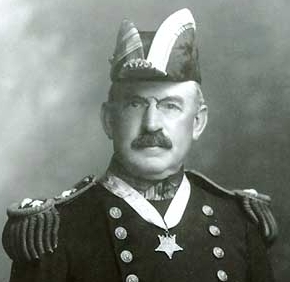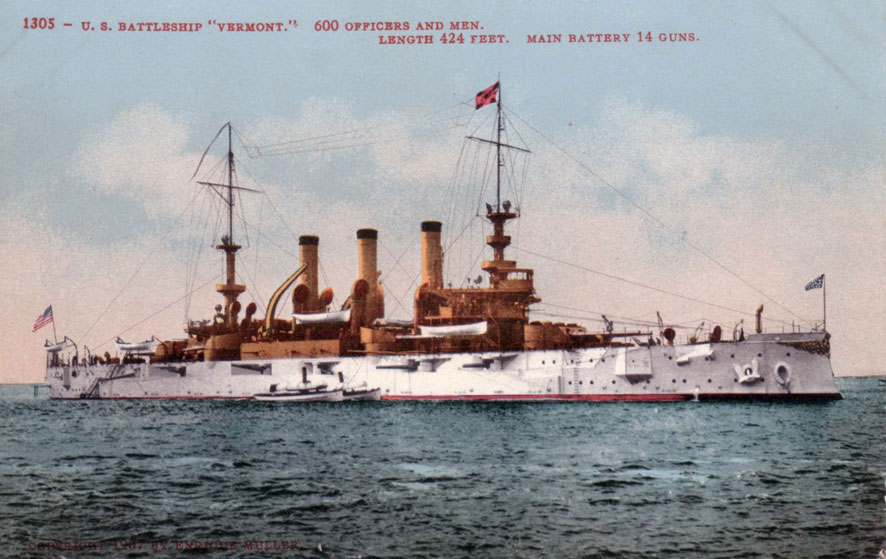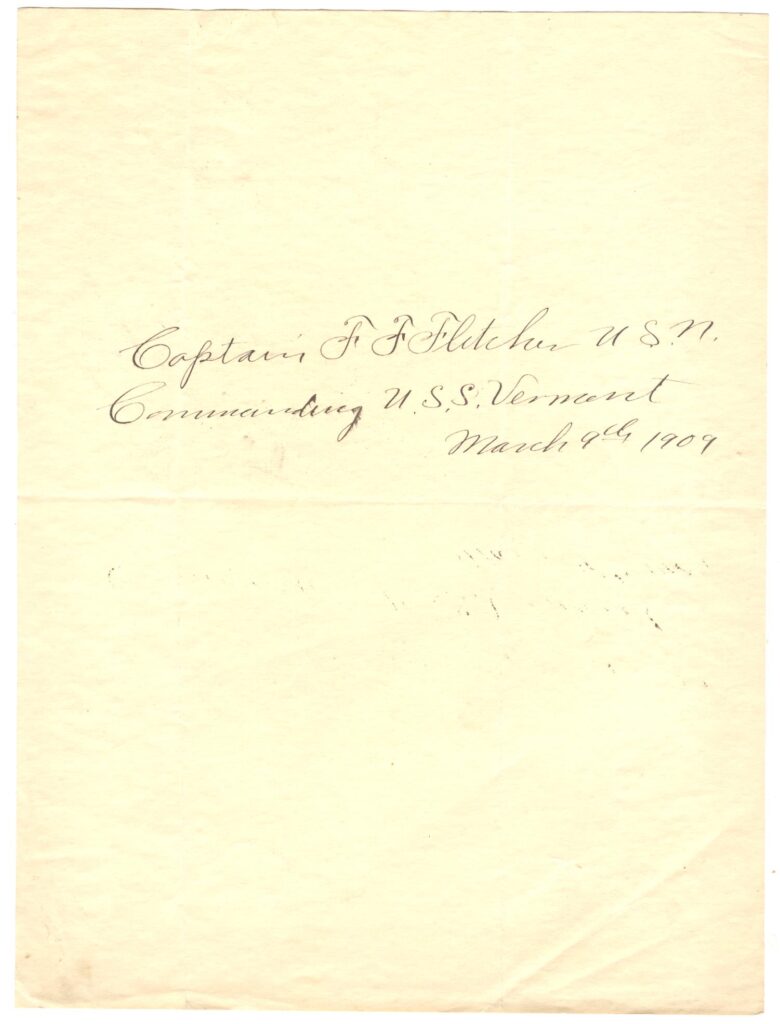Apologies, but no results were found for the requested archive. Perhaps searching will help find a related post.
Frank Friday Fletcher (November 23, 1855 – November 28, 1928) was a United States Navy admiral who served in the late 19th and early 20th centuries. He was awarded the U.S. military's highest decoration, the Medal of Honor, for his actions as commander of navy forces at the Battle of Veracruz, Mexico. The Fletcher-class destroyer, the most produced class of United States Navy destroyers, was named after him. He was also the uncle of Frank Jack Fletcher, another U.S. Navy Admiral who also received the Medal of Honor for actions at Veracruz, and who commanded U.S. naval forces at the battles of Coral Sea and Midway during the Second World War.
captains of the fleet
- Captain Osterhaus, USS Connecticut (flagship)
- Captain Vreeland, USS Kansas
- Captain Hubbard, USS Minnesota
- Captain Potter, USS Vermont
- Captain Wainwright, USS Louisiana
- Captain McCrea, USS Georgia (flagship)
- Captain Nicholson, USS Nebraska
- Captain Southerland, USS New Jersey
- Captain Murdock, USS Rhode Island
- Captain Schroeder, USS Virginia
- Captain Niles, USS Louisiana (flagship)
- Captain Sharp, USS Virginia
- Captain Merriam, USS Missouri
- Captain Bartlett, USS Ohio
- Captain Beatty, USS Wisconsin
- Captain Bowyer, USS Illinois
- Captain Hutchins, USS Kearsarge
- Captain Cowles, USS Kentucky
- Captain Harber, USS Maine
- Captain Veeder, USS Alabama
- Captain Qualtrough, USS Georgia
- Captain Doyle, USS Missouri
- Captain Fletcher, USS Vermont
- Captain Howard, USS Ohio
(provided by Wikipedia) - Fletcher was born on November 23, 1855, in Oskaloosa, Iowa. He was the uncle of World War II Admiral Frank Jack Fletcher. He graduated from the U. S. Naval Academy in 1875 and spent the next year as a midshipman on USS Tuscarora. Promoted to ensign in July 1876, he had sea duty on the sloops of war Portsmouth, Plymouth, Lackawanna and Constellation before participating in USS Ticonderoga's voyage around the world in 1878–1881. Fletcher advanced to the rank of master (later lieutenant, junior grade) in April 1882 and was next assigned to the Hydrographic Office in Washington, D.C. In July 1884, he reported to USS Quinnebaug for service in European waters. After ordnance training in late 1887, he had five years' duty at the Bureau of Ordnance, during which time he was promoted to lieutenant and made notable contributions to gun mechanism design and shipboard navigation.
From 1892 to 1895, Fletcher commanded the navy's first torpedo boat, USS Cushing, based at the Torpedo Station in Newport, Rhode Island, and developed the navy's first torpedo warfare doctrine. He then served in the battleship USS Maine before returning to the Newport Torpedo Station in October 1896. After a brief tour as Assistant Chief of the Bureau of Ordnance in the spring of 1898, Lieutenant Fletcher became commanding officer of the converted yacht USS Kanawha. From October 1898 to July 1901 he commanded the surveying ship USS Eagle and, in March 1899, was promoted to lieutenant commander.
In the fall of 1901, Fletcher returned to ordnance duty and was closely involved with torpedo warfare. A year later he became Chief of Staff of the Asiatic Fleet and later in 1905 assumed command of the cruiser USS Raleigh. Fletcher attended the Naval War College courses in both 1907 and 1908 and in 1908 was assigned to the navy's General Board during the next year. That same year, he became a member of the District of Columbia Society of the Sons of the American Revolution.
He was promoted to captain in May 1908 and from November of that year to March 1910 he commanded the battleship USS Vermont. In the spring of 1910, Fletcher became the Secretary of the Navy's Aide for Material. While in that post, he reached the rank of rear admiral. From 1912 to 1914, he commanded battleship divisions of the Atlantic Fleet. In April 1914, Fletcher led U.S. Navy forces during the landings at Vera Cruz, Mexico, receiving the Medal of Honor for his "distinguished conduct in battle".
In September 1914, Fletcher began two years as the Atlantic Fleet's Commander in Chief, and was elevated to the rank of admiral in March 1915, the senior of the first three officers to hold the new four-star positions. He was a member of the General Board, the Joint Army and Navy Board and the War Industries Board in 1916–1919, and was awarded the Navy Distinguished Service Medal for "meritorious service" during World War I. He was also awarded the Army Distinguished Service Medal for his work as the navy representative on the War Industries Board.
Admiral Fletcher retired on November 23, 1919, with the rank of rear admiral (as was customary at that time), and subsequently served as an official advisor on contemporary defense issues. Fletcher died on November 28, 1928, in New York City. He was buried in Arlington National Cemetery.
Autographed page captain fletcher, uss vermont
This is one of my favorite autographs because it was from a period before Frank Friday Fletcher earned the Medal of Honor. It is signed and dated March 9th, 1909, just after the return of the battleship cruise from it's trip around the world.
His Citation for the Medal of Honor reads:
For distinguished conduct in battle, engagements of Vera Cruz, 21-22 April 1914. Under fire, Rear Adm. Fletcher was eminent and conspicuous in the performance of his duties; was senior officer present at Vera Cruz, and the landing and the operations of the landing force were carried out under his orders and directions. In connection with these operations, he was at times onshore and under fire.



